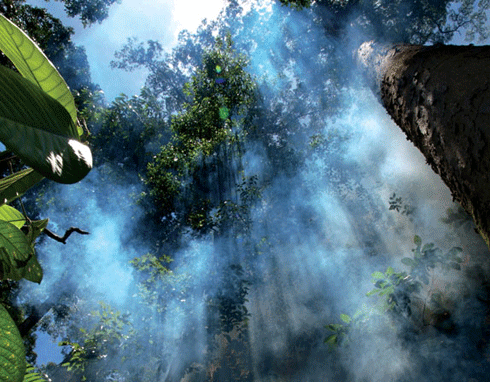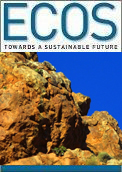
|
Published: 6 February 2012
Carbon loss from tropics’ deforestation revised down
Tropical deforestation has been considered a major source of greenhouse gases (GHGs), releasing as much as 1.1 billion tonnes of carbon into the atmosphere each year. But recent research suggests the stored carbon released by deforestation may be less than previously thought.

|
|
Rainforest in Malaysia, Borneo. Carbon emissions from deforestation of tropical forests such as this may be less than previous estimates. Credit:
©SEARRP
|
The research, published in Nature Climate Change produced the world’s first high-resolution (500 x 500 m) ‘carbon storage’ map of above-ground biomass density of forests, shrublands and savannas in the tropics of Africa, Asia and South America.
This map, based on direct satellite and field observations rather than averaged estimates as in the past, provides a basis for estimating carbon emissions associated with vegetation loss through land-use change.
Collaborators in 12 countries collected the remote sensing and field data used by the researchers to produce the map.
‘Previous maps were of much coarser resolution and yielded wildly different estimates of both regional totals and spatial distribution,’ explained co-author Richard Houghton from Woods Hole Research Centre (WHRC) in the US.
Lead author Alessandro Baccini, also from WHRC, added that the team had also improved the way in which degradation and growth of vegetation are factored into biomass density calculations. Previous estimates used 'average' biomass densities that may have biased past estimates of GHG emissions.
The team used the new data and mapping approach to arrive at more reliable estimates of both carbon storage and carbon emissions released into the atmosphere by changes in land cover and use.
From the new data, researchers concluded that current models may overestimate by 11-12 per cent the net flux of carbon into the atmosphere due to tropical vegetation loss.
The information is particularly important for countries trying to meet GHG reporting requirements under the United Nations Framework Convention on Climate Change (UNFCCC).
These countries need an accurate way to calculate stored carbon and track deforestation and reforestation so that they can reliably report emissions to the UNFCCC, and participate in international schemes such as Reducing Emissions from Deforestation and Forest Degradation (REDD+), which provides compensation for avoided deforestation.
Source: EurekAlert!/WHRC



